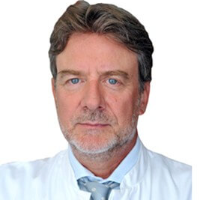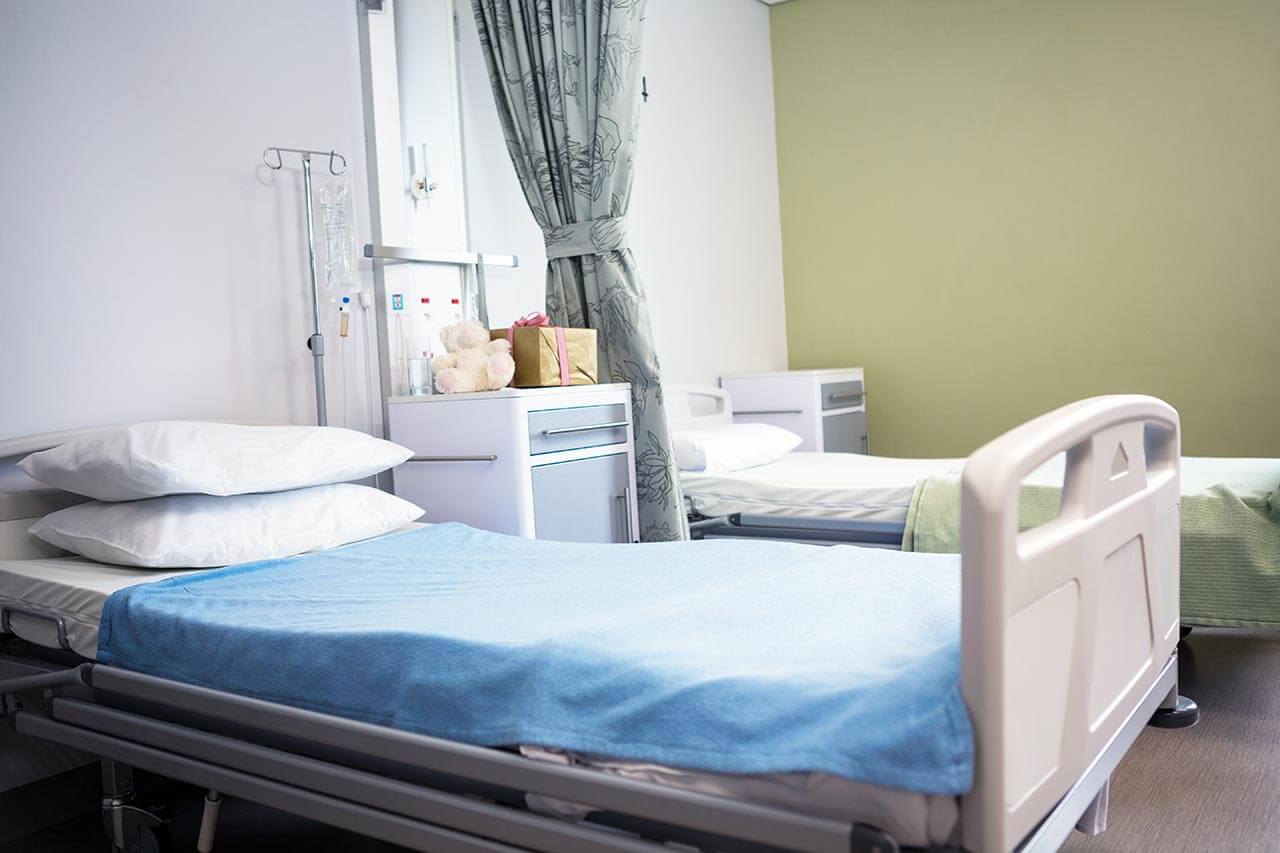
The program includes:
- Initial presentation in the clinic
- clinical history taking
- general clinical examination
- laboratory tests:
- complete blood count
- biochemical blood analysis
- complete hormonal analysis
- abdominal and pelvic ultrasound
- nursing services
- consultation of related specialists
- consultation of the chief physician and all leading experts
- development of individual treatment plan
- written statement
Required documents
- Medical records
Service
You may also book:
 BookingHealth Price from:
BookingHealth Price from:
About the department
The Department of Pediatric Surgery and Urology at the Children's Hospital Amsterdamer Cologne offers the widest range of surgical interventions for children, except for heart surgery. The department's team of surgeons excellently performs operations for congenital diseases and malformations in newborns and premature babies, genitourinary malformations, foot and hand malformations, benign and malignant tumors, fractures, and general diseases in children, including hernia, appendicitis, and gastroesophageal reflux disease. The department also provides medical care to young patients with severe burns. With 80 beds, the department is one of the largest Pediatric Surgery Centers in Germany. The department's specialists perform more than 5,500 surgical interventions every year. In most cases, treatment is provided using sparing minimally invasive techniques. The department's doctors and nursing staff get along well with children, surround them with care, and strive to establish a trusting relationship. In addition, the department has play areas, and children can distract from the therapeutic process during their free time. The Head Physician of the department is Prof. Dr. med. Dr. h.c. Thomas Boemers.
The department's specialists have unique experience and are highly competent in the treatment of pathologies of the urinary system, such as kidneys, ureters, bladder, urethra, and male genitalia. Congenital pathologies such as cryptorchidism, hypospadias, vesicoureteral reflux, and varicocele, as well as functional disorders, including voiding dysfunction, are treated here. During diagnostics and treatment, the department cooperates closely with other departments at the hospital, including physicians specializing in pediatric and adolescent medicine and pediatric radiology. A special focus in the field of pediatric urology is on urinary incontinence therapy. A surgical intervention is most often required to repair congenital malformations of the reproductive system in boys. As a rule, operations for cryptorchidism, hypospadias, varicocele, and other malformations are performed using minimally invasive techniques on an outpatient basis.
The department's surgeons have unique competence in the treatment of complex congenital pathologies, including bladder exstrophy, anal atresia, cloacal malformations, cloacal exstrophy, etc. The department's doctors admit children not only from all over Germany but also from abroad. In addition, children with urethral or genital malformations, as well as malformations of the external genitalia, are treated here. Whenever possible, minimally invasive interventions are performed. Recovery after such operations is fast, and the child experiences almost no pain in the postoperative period.
The medical facility is one of the few in all of Europe where surgeons have accumulated impressive experience repairing congenital and acquired hand and foot malformations in children. The surgeons regularly treat young patients with polydactyly, syndactyly, symbrachydactyly, macrodactyly, clinodactyly, camptodactyly, clubfoot, pes cavus, and pes equinus. In most cases, surgery is required to repair the above-mentioned malformations. The department's specialists prefer sparing microsurgical techniques, which ensure excellent therapeutic and aesthetic results.
The department's surgical options include:
- Surgical treatment of abdominal diseases, including surgical repair of malformations in children
- Surgery for anal atresia
- Surgery for gastroesophageal reflux disease: fundoplication and Politano, Cohen, and Gregoir techniques
- Surgery for stoma formation and closure
- Surgical excision of anal fissures
- Appendectomy
- Surgery for the removal of dermoid cysts and small skin tumors
- Surgery for hemangioma and nevus resection
- Surgery for neck cyst and fistula resection
- Gastrostomy formation
- Surgery for cloacal exstrophy
- Surgery for Hirschsprung's disease
- Liver resection surgery for cysts and tumors
- Surgery for inguinal and diaphragmatic hernias
- Laparoscopic formation of a percutaneous endoscopic gastrostomy
- Surgery for esophageal atresia
- Pyloromyotomy
- Surgical treatment of diseases of the chest organs, including surgical repair of malformations in children
- Nuss procedure for pectus excavatum repair
- Thoracotomy for pulmonary sequestration and bronchogenic cysts
- Surgical treatment of genitourinary diseases and malformations in children
- Circumcision
- Cystoplasty
- Botox injections into the bladder
- Surgery for bladder exstrophy
- Orchiopexy through an inguinal approach
- Surgery for testicular torsion
- Surgery for hypospadias
- Surgery for epispadias
- Nephrostomy
- Frenulotomy (plastic surgery of the frenulum of the penis)
- Heminephrectomy
- Heminephroureterectomy
- Neovagina formation
- Feminizing genitoplasty
- Renal pelvis plastic surgery
- Ureterocutaneostomy
- Ureterocystoneostomy
- Surgical repair of congenital and acquired hand and foot malformations
- Surgery for polydactyly
- Surgery for syndactyly
- Surgery for symbrachydactyly
- Surgery for macrodactylia
- Surgery for clinodactyly
- Surgery for camptodactyly
- Surgery for clubfoot
- Surgery for pes cavus
- Surgery for pes equinus
- Surgical treatment of malignant tumors
- Surgery for Wilms tumor
- Surgery for neuroblastoma
- Surgery for bone and soft tissue sarcomas
- Surgical treatment of burns, including severe ones
- Skin grafting
- Surgical treatment of complex malformations
- Complex malformations of the esophagus and respiratory tract
- Cleft lip and palate
- Other surgical treatment methods
Curriculum vitae
Higher Education and Professional Career
- 1978 - 1985 Medical studies, Ludwig Maximilian University of Munich.
- 1985 Thesis defense, Ludwig Maximilian University of Munich.
- 1985 - 1997 Preparation for board certification in Adult and Pediatric Urology, Pediatric Surgery, University Hospital Luebeck, City Hospital Munich Schwabing, University Hospital Rechts der Isar Munich, University Hospital Utrecht, Netherlands.
- 1997 - 1999 Managing Senior Physician, Department of Surgery, Altona Children's Hospital, Hamburg.
- 1999 - 2001 Senior Physician, Department of Pediatric Surgery, Section of Pediatric Urology and Urinary Incontinence Surgery, University Hospital Tuebingen.
- 2001 - 2005 Board Member and Head Physician, Department of Pediatric Surgery, Salzburg State Hospital and Paracelsus Medical University, Salzburg, Austria.
- Since September 2005 Head Physician, Department of Pediatric Surgery and Urology, Children's Hospital Amsterdamer Cologne.
- 2001 Habilitation and Venia Legendi in Pediatric Surgery, Faculty of Medicine, University of Tuebingen.
- 2007 Extraordinary Professorship, Faculty of Medicine, University of Tuebingen.
- 2012 Extraordinary Professorship, Faculty of Medicine, University of Cologne.
Photo of the doctor: (c) Kliniken der Stadt Köln gGmbH
About hospital
The Children's Hospital Amsterdamer Cologne has the status of one of the largest and most respected pediatric medical centers in Germany. The medical facility is the Academic Hospital of the University of Cologne, with a long history of more than 55 years. The hospital employs competent specialists in various fields of pediatric medicine who apply their experience and knowledge for the treatment of young patients with various pathologies, ranging from bronchial asthma, diabetes mellitus, epilepsy, and malformations to cancer and mental disorders. The most important areas of specialization are pediatric surgery and urology.
The medical team of the hospital treats over 10,000 inpatients every year. It performs more than 5,000 surgical interventions on children annually. In addition, the emergency medical service provides its services to about 35,000 patients annually. The medical facility has 292 beds for inpatient treatment.
The hospital cooperates closely with maternity hospitals in the city of Cologne, as well as with the University Hospital of Cologne and other children's hospitals. The hospital offers all modern facilities and medical and technical equipment for the accurate diagnosis and high-quality treatment of children of various age groups, from extremely premature infants to adolescents and teenagers. The involvement of parents in the therapeutic process plays a significant role in the treatment of young children.
The work of the hospital is recognized by prestigious quality certificates, particularly the Ausgezeichnet. FÜR KINDER certificate. This certification was given to the Department of Pediatric and Adolescent Medicine as well as to the Department of Pediatric Surgery and Urology. This certificate is one of the top awards given to medical centers for excellent inpatient medical care in Germany, so parents can be sure that the health of their children is in the safe hands of true professionals.
Photo: (c) depositphotos
Accommodation in hospital
Patients rooms
The young patients of the Children's Hospital Amsterdamer Cologne live in comfortable and cozy rooms. The standard room furnishings include an automatically adjustable bed, a bedside table with a pull-out tray, a TV, a wardrobe, a table, and chairs. Each patient room has an ensuite bathroom with a shower and a toilet.
One of the parents may stay in the patient room with their child. The hospital also offers accommodations for parents. Parents from other cities or countries have the opportunity to stay at the Ronald McDonalds Haus Hotel.
Meals and Menus
The young patients are offered a daily choice of three menus. If, for some reason, a child does not eat all the foods, they will be offered an individual menu. Please inform the medical staff about the preferences of your child prior to treatment.
The parents can eat in the cafeteria after receiving meal vouchers from the hospital administration. During inpatient treatment, they are also offered drinks, such as tea and coffee.
Further details
Standard rooms include:




